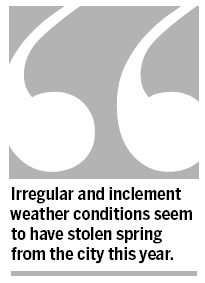-
-
China Daily E-paper
Alexis Hooi
How climate change stole springtime
By Alexis Hooi (China Daily)
Updated: 2010-04-23 07:44
 |
Large Medium Small |

Budding magnolias in public parks, flowing willows along thawed canals and verdant sidewalks with fresh hedges - these are just some of the familiar signs of spring in Beijing.
For many residents of the increasingly built-up capital, the few spots of greenery are made more welcome after the long, harsh winters up here in the north.
But the seasonal growth this late April looks like a fraction of the urban foliage in past years.
Irregular and inclement weather conditions seem to have stolen spring from the city this year.
Cold fronts and snowstorms alone have been relentless against the northern regions.
Since November last year, average temperatures in Hebei province, Beijing and Tianjin have been the lowest of the period in the past four decades, figures from the National Climate Center show. Mercury levels in the northeast provinces of Heilongjiang, Jilin and Liaoning also hit record lows.
Similarly, cold weather has delayed the growth of wheat crops in Anhui, Jiangsu and Gansu provinces. Even the longjing (dragon well) tea plantations of Zhejiang province have not been spared. Lower temperatures have delayed the harvest from more than 100,000 hectares growing the famous green tea, producers say.
Sandstorms are adding to the misery. At least eight sandstorms are expected to hit the northern areas this spring because of the cold spells, meteorologists have said. Originating from areas including the Inner Mongolia and Ningxia Hui autonomous regions, the sandstorms have already affected about 270 million people in 16 provinces and covered 2 million square kilometers across the country.
To confound the problem, a severe drought has hit the southern regions and left more than 18 million residents and at least 11 million heads of livestock without drinking water in an area stretching from the southwestern provinces of Yunnan, Guizhou and Sichuan, as well as the Guangxi Zhuang autonomous region and Chongqing municipality, Ministry of Civil Affairs figures show.
Meteorologists say rainfall in the worst-hit area of Yunnan since September last year has been the lowest in half a century.
Lingering cold from the north is part of a maelstrom of widespread anomalous climate conditions that are behind the dry spell, they say.
Natural disasters related to the climate have risen from less than 50 a year in the 1950s to between 350 and 450 annually in the 21st century. Last year, extreme weather affected 55 million people worldwide, figures from the UN International Strategy for Disaster Reduction show.
Over in the West, the global warming from climate change is being blamed for an early spring this year in the United States instead. The difference and inconsistency in worldwide weather patterns only help fuel debate about the scientific authenticity of global warming, in which human activities have been singled as its cause.
Still, science or not, many people now see climate change through the seasons they immediately experience as the big bogeyman buffeting millions around the world with increasingly irregular weather.
At the very least, such rising awareness of the changing environment will remind them of the importance of sustainable solutions for a more promising future.
E-mail: alexishooi@chinadaily.com.cn
(China Daily 04/23/2010 page8)









